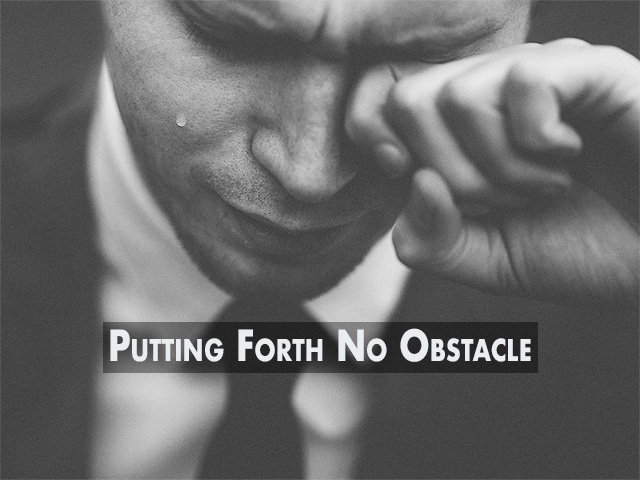by Andy Young
The good news of Jesus Christ is offensive. Many who heard Christ found His teaching hard and stopped following Him (John 6:60–66). Others turned away disheartened and sorrowful at His message (Mark 10:22). Similarly, the Apostle Paul’s clear preaching of the gospel caused confusion and hostility almost everywhere he went. Since then, Christians in every culture have faced stern opposition to their declaring the glories of Christ.
While Paul and the early church knew the reality of this, they were still at pains to do everything within their power to ensure that the gospel was heard clearly. Rather than becoming resigned to the fact that many would reject Christ, they went to great lengths to remove impediments from hearing and accepting Him. This is why in 2 Corinthians 6:3–4 Paul asserts, “We put no obstacle in anyone’s way, so that no fault may be found with our ministry, but as servants of God we commend ourselves in every way.”
If we are to faithfully engage our world today with the gospel, we need to declare it boldly and without compromise. Yet this needs to be coupled with a purposeful removal of all human obstructions that will prevent sinners from hearing, believing, and following the Christ we proclaim.
relinquishing our rights
To remove hindrances to the gospel, we first need to give up our own rights. Paul tells the Corinthian church in his first letter that he “endure[d] anything rather than put an obstacle in the way of the gospel of Christ” (1 Cor. 9:12). In context, he is talking about the right of gospel workers to receive financial support for their ministry. Having established the biblical principle for this, he then reminds his readers that he surrendered this right. Why? To cause no obstacle for the gospel.
This principle is at the heart of the gospel itself. Christ set aside His own rights as the eternal Son of God, becoming sin for us and dying on the cross. He sacrificed Himself for the sake of others. Paul embodies this principle in 1 Corinthians 9 and teaches it in 2 Corinthians 6. We are to be ready to forgo what is rightfully ours so that nothing—not even ourselves—will get in the way of the gospel. This is simply a call to live true to Christ and the gospel we believe and offer.
Proclaiming the gospel in a context bereft of love is to erect a barrier that will turn many people away from Christ.
The glory of this is that as we relinquish our own rights, we become more like our Savior. When we do this, we live in integrity with the good news that we love and proclaim. As our culture hears the gospel message of a Christ who gave up everything for His people, and they see that same message lived out in our lives, they will be left without excuse to follow Christ.
removing all obstacles
In addition to relinquishing our rights, we need to remove all possible obstacles. Paul’s first letter to the Corinthians highlights some of these obstacles. Divisions (1 Cor. 1; 3), sexual immorality (chs. 5; 6), lawsuits among believers (ch. 6), and doctrinal error (ch. 15) spoil the reputation of Christians in the world and undermine the effectiveness of the gospel. Added to this are an unwillingness to bear with “weak” brothers (ch. 8) and idol worship (ch. 10). All these hamper the reception of the gospel among unbelievers. All Christians and all churches should go out of their way to ensure that none of these things are present in their lives.
Obstacles can also be things that are absent. A church can be doctrinally pure and morally upright yet lack love (ch. 13). This will be a serious hindrance to the gospel. Therefore, we should endeavor to speak and live the gospel in a warm and compelling way. This will mean taking a real interest in the lives of others. Genuine friendship adorns the gospel in a powerful way and can itself remove many obstacles. Providing a listening ear, patiently answering questions, and offering help in time of need will smooth the path for the gospel to be heard and believed. Proclaiming the gospel in a context bereft of love is to erect a barrier that will turn many people away from Christ.
recommending the gospel
As well as removing obstacles, we are to recommend the gospel. We are to be walking and talking advertisements for Jesus Christ. In the verses after 2 Corinthians 6:3–4, Paul outlines several things that he and his companions did to commend the gospel. They are all counterintuitive. Even though they were poor, they gave riches; being dead, they offered life. This emphasizes the cost of gospel ministry. Readiness to pay the personal price of living under the lordship of Christ is itself part of recommending the gospel to others. In a world where “self” has become an idol, Christians who suffer loss to ensure that others enjoy the gain of Christ are a poignant display of the beauty of the gospel message.
Paul also highlights the endurance required in this. Whether he faced affliction or imprisonment, and much else besides, he sought to be faithful to Christ (vv. 4–10). Whatever situation he found himself in, he used it as an opportunity to promote Jesus Christ. This gritty faithfulness to his Lord and Savior commended the gospel and was a further way that he ensured that there were no obstacles to its reception.
This is needed more than ever in our world today. What we preach matters, and so does how we preach and live it. We need a church that is faithful and bold in preaching the truth of the Bible. We also need Christians who patiently recommend Christ through the integrity of their Christian lives. May we, like Paul, be true to the gospel while putting forth no obstacle to the gospel.
Rev. Andy Young is the minister of Oxford Evangelical Presbyterian Church in England.


Recent Comments